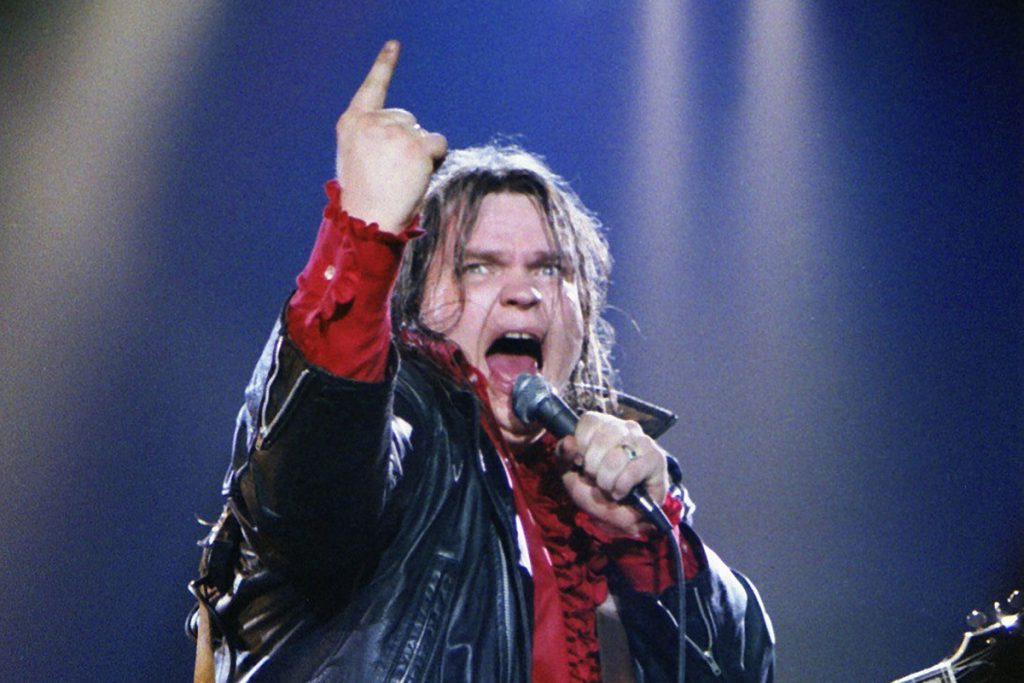Obituary: Meat Loaf had a career that had to be heard and seen to be believed

Meat Loaf performs at Wembley Arena in London on the ‘Dead Ringer’ tour, on April 27, 1982. Photo: Pete Still/Redferns.
Meat Loaf died Thursday at the age of 74. That surely robs the world of one of its great, unique talents and is truly sad for those of us who enjoyed him.
Selfishly, I’m glad that if Meat Loaf had to die this week, at least he died right before my day off. Otherwise, I would’ve accomplished nothing at work. Because, like a rogue spaceship tipping over the horizon into a black hole, I was magnetically caught in the gravity of Meat Loaf videos less than a day after his death. That led me to a startling conclusion:
The “Paradise by the Dashboard Light” video may possibly be the best eight-and-a-half minutes of the 1970s. I watched “Paradise” at least a half dozen times before noon. I watched it another half dozen before I started writing this. And I’ll probably watch it three or four more times before I‘m done here.
I sang along at the gym. I smiled a lot. I giggled. I marveled at the drama packed into such a bazooka voice. As good as Meat Loaf’s voice was – and it was as explosive as it could be gentle – it may not have been as powerful as his presence. I listened in the car. I had “We were barely 17 and we were barely dressed” on a mental loop all day.
My God, the man was a performer.
You can listen to Meat Loaf’s music, but that’s only half the experience. There might never have been a Chris Farley or a Jack Black had Meat Loaf not given them the template of a large man moving on stage with such dramatic grace and sweaty athleticism (Meat Loaf even toured with the National Lampoon gang as an understudy for John Belushi before he broke big).
The Loaf was so potent while performing, he even possessed a weird sexiness (not that the 11-year-old me could peel my eyes off Ellen Foley in those videos). Meat Loaf meant it. Despite leaving a slight tongue-in-cheek impression, he lived it. He owned it.
Drama came naturally. Born Marvin Lee Aday in 1947, Meat Loaf grew up in an abusive Texas household. His violent alcoholic father was reportedly calling him Meat when he was still a baby. Kids teased him for his size – though that may have changed when he became a high school football player.
He went to Los Angles and joined some bands. He was cast in “Hair” in 1968 and got some big screen, scene-stealing fame playing bad-boy Eddie in “Rocky Horror Picture Show.” The drama scene was how he hooked up with songwriter Jim Steinman, who became his writing partner before the two made the massively successful “Bat Out of Hell.”
It was so successful that there was nowhere to go but down. He became a punchline over the years, working occasionally in movies and putting out unsuccessful records. He declared bankruptcy. He was a has-been, until the weirdest thing happened: Because Meat Loaf’s life was nothing if not dramatic, he made one of the biggest and most unlikely comebacks ever. In 1993, he re-teamed with Steinman on “Bat Out of Hell II: Back into Hell,” which sold an astounding 14 million copies when Nirvana was the biggest band on the planet.
And we still haven’t pried “I Would Do Anything for Love” out of our heads.
His career still had ups and down the next few decades – lots of touring, a memorable appearance in “Fight Club.” Meat Loaf’s role as Durden-devotee Robert Paulson in David Fincher’s classic 1999 film was hailed by critics. His depiction of toxic masculinity, as symbolized by his battle with testicular cancer following years of steroid abuse as a body builder, provides some of the film’s only real tenderness, and his pain and vulnerability provide an important counterpoint to the film’s relentless brutality.
But his place in rock history was in place. The world is a little less musically dramatic today.
Writer David Gill contributed to this story. Follow music critic Tony Hicks at Twitter.com/TonyBaloney1967.
